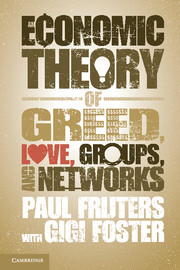Book contents
- Frontmatter
- Contents
- List of figures
- Preface
- Acknowledgments
- Introduction and preview
- PART I Greed and love
- 1 Individual materialism, organizations, and power: The view from mainstream economics
- 2 Love: The missing building block
- PART II Groups, power, and the development of institutions
- PART III Implications and examples
- References
- Index
1 - Individual materialism, organizations, and power: The view from mainstream economics
Published online by Cambridge University Press: 05 May 2013
- Frontmatter
- Contents
- List of figures
- Preface
- Acknowledgments
- Introduction and preview
- PART I Greed and love
- 1 Individual materialism, organizations, and power: The view from mainstream economics
- 2 Love: The missing building block
- PART II Groups, power, and the development of institutions
- PART III Implications and examples
- References
- Index
Summary
All that interests me is money.
– Salvador Dali, quoted in Frey (2003), p. 7This chapter reviews the mainstream economic treatments of the following broad concepts: the atomistic economic agent, the competitive forces that give rise to organizations, the defining features of trade networks, and the nature of power. For brevity, what is outlined below simply summarizes the mainstream view presented in the most popular textbooks for undergraduate and graduate students within the discipline of economics.
The goal of this chapter is to demonstrate the great predictive strength of the mainstream economic view, but it will also point out explicitly the “black boxes” that this mainstream view does not fully capture. The main point of the rest of the book is then to fill in these black boxes.
Homo Economicus: Humans as individual rational wealth maximizers
The basic workhorse model of human motivations in modern economics contends that humans are mainly motivated by greed and rationally weigh different options for resource allocation. According to this view, an individual behaves as an “individually rational agent,” trying to attain maximum personal benefit from limited material resources. George Stigler expresses the mainstream view thus: “Man is eternally a utility-maximizer – in his home, in his office (be it public or private), in his scientific work – in short, everywhere” (taken from the Tanner Lectures, quoted in McKenzie 1983).
- Type
- Chapter
- Information
- An Economic Theory of Greed, Love, Groups, and Networks , pp. 41 - 73Publisher: Cambridge University PressPrint publication year: 2013



